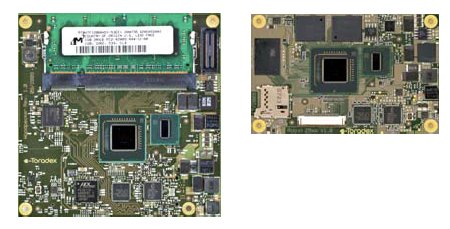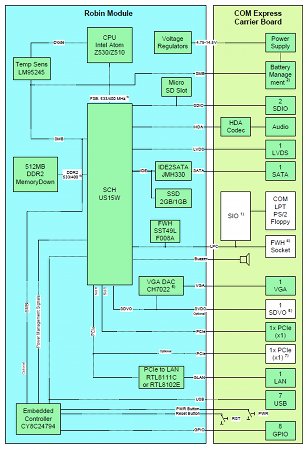Atom module shrinks to nano size
Feb 27, 2009 — by LinuxDevices Staff — from the LinuxDevices Archive — 8 views Toradex is now sampling a credit card-sized COM Express module based on Intel's Z5xx Atom processor. Available in 1.6GHz Z530 and 1.1GHz Z510 models, the “Robin” board is equipped with seven USB 2.0 ports, gigabit Ethernet, an SATA port, and a microSD slot, the company says.
Toradex is now sampling a credit card-sized COM Express module based on Intel's Z5xx Atom processor. Available in 1.6GHz Z530 and 1.1GHz Z510 models, the “Robin” board is equipped with seven USB 2.0 ports, gigabit Ethernet, an SATA port, and a microSD slot, the company says.
Toradex's new Robin module is very similar technically to the 95 x 95mm Woodpecker module the company introduced last year. However, as the photo below illustrates, the Robin is significantly smaller, adopting Kontron's 84 x 55mm nanoETXexpress form factor. (Toradex prefers to describe its downsized modules as “nano COM Express,” a less gnarly moniker).

The Woodpecker (left) and the Robin (right), shown to scale
Source: Toradex
While it doesn't suggest a target market for the Robin, Toradex says that like the Woodpecker, the device offers “high performance computing with low power consumption.” The Robin uses Intel's by-now-familiar 1.1GHz Atom Z510 and 1.6GHz Z530 CPUs, paired, as ever, with the chipmaker's comparatively large SCH US15W companion chip.
The Z510 Robin has a 400MHz frontside bus, while the Z530 Robin Z530 gets a 533MHz frontside bus. The Z530 Atom processor also offers hyper-threading, whereas the Z510 does not, notes Toradex. The Robin Z510 uses from 3.5 to 5.0 Watts, while the Robin Z530 uses from 5.1 to 7.6 Watts, says Toradex.

A block diagram for Toradex's Robin modules
(Click to enlarge)
The Woodpecker offered an SODIMM slot accepting up to 2GB of RAM, but the smaller Robin doesn't have room for a slot. Instead, the little module is provided with 512MB of soldered-on DDR2 RAM. Unlike the Woodpeckers, it also includes onboard flash storage — 1GB in the case of the Robin Z510, and 2GB in the case of the Robin Z530.
The Robin includes a microSD slot, for additional memory. Connections to the outside world are made by both a COM Express connector, on the back of the module, and a 30-pin FFC (flat flexible cable) connector, on the front. According to Toradex, this FFC connector provides access to an additional SDIO channel, supplementing the one already available via COM Express.
In addition to SDIO, interfaces on the Robin include PCIe x1, ExpressCard, gigabit Ethernet, high definition audio, SATA, seven USB ports, VGA, TV output, and LVDS, with support for displays up to 1366 x 768 pixels in size. Via USB, the modules can also offer eight GPIOs as well as I2C, says Toradex.
As it did with the Woodpecker products, Toradex offers a couple of build options for “high volume” customers. The Ethernet controller on the Robin can be replaced by a second PCIe x 1 interface, while the VGA video output can be replaced by SDVO, according to the company.
Features and specifications listed by Toradex for the Robin Z510 and Z530 include:
- Processor — Intel Atom Z510 (1.1GHz) or Z530 (1.6GHz)
- Memory — 512MB of soldered-on DDR2 RAM, and 1GB (Z510) or 2GB (Z530) of flash storage
- Storage — microSD slot
- Display — Supports VGA, TV output, and LVDS displays (with SDVO build option)
- Networking — Gigabit Ethernet
- Other I/O:
- 7 x USB 2.0
- 1 x SATA (via IDE bridge)
- HD audio
- LPC
- SMB
- I2C
- 8 x GPIO
- 7 x USB 2.0
- Expansion:
- 1 x PCI Express x1 interface (second PCIe x1 interface can replace Ethernet as a build option
- 1 x microSD slot
- 2 x SDIO (one via COM Express connector, one via FFC connector)
- 1 x PCI Express x1 interface (second PCIe x1 interface can replace Ethernet as a build option
- Power consumption:
- 5.1 to 7.6 Watts, Z530
- 3.5 to 5.0Watts, Z510
- 5.1 to 7.6 Watts, Z530
- Power supply — nominal 12VDC
- Dimensions — 3.3 x 2.15 inches (84 x 55mm)
- Operating temperature — tbd
Toradex says the Robin Z530 and Robin Z510 are compatible with Linux, Windows XP Embedded, Windows XP, Windows Vista, Windows CE 6.0, and VxWorks.
According to Toradex, the devices are sampling now. Quantity one pricing for the Robin Z530 is 179 Euros, and 129 Euros for the Robin Z510, the company says.
Further information, including pricing for multiple units, may be found on the company's website, here.
This article was originally published on LinuxDevices.com and has been donated to the open source community by QuinStreet Inc. Please visit LinuxToday.com for up-to-date news and articles about Linux and open source.